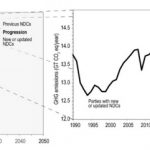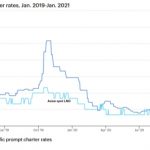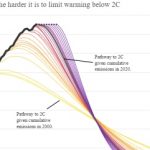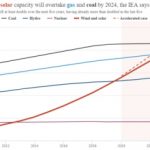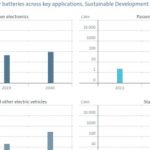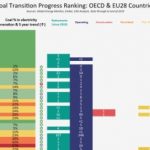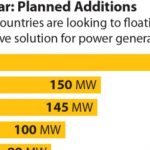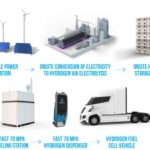Behaviour change is now inextricably linked to the transition and must be part of the world’s emissions reduction strategy, and there are many different types of relevant behaviour and ways to measure the impacts. One is to look at deforestation, caused by chopping down trees to meet our consumer needs. To grasp whose behaviour has to change we need to appreciate to what extent deforestation in places like Brazil, Canada, Liberia, Vietnam etc., … [Read more...]
Updated NDCs: World committing to 0.5% emissions cuts by 2030. It should be 45%
The latest national climate pledges, submitted over the new year, show that the world is nowhere near meeting our emissions reductions goals. Analysis of the 48 updated “nationally determined contributions” (NDCs) submitted so far (everyone must submit by the end of this year), covering nations responsible for 29% of global emissions, shows we will have 0.5% lower emissions in 2030 compared to 2010. That’s way off the target 45% reduction needed. … [Read more...]
EU, U.S. exploring new sources of Rare Earth Minerals, should China limit exports
Reports are emerging that China is considering the restriction of the export of rare earth minerals, as a result of tensions with the U.S. Given China controls around 80% of global supply it would have severe consequences for not just advanced military applications (the presumed primary target) but also clean energy technologies like EVs and wind turbines. However, if the threat is carried out, Lukas Trakimavičius explains how this could backfire … [Read more...]
Asia’s record Gas prices expose the need for faster market reform
After record lows in mid-2020, Asian spot prices for LNG rose tenfold to reach record highs in January 2021. This volatility is an obstacle to the development of the gas infrastructure that’s essential to the region where demand for gas is growing, explain Jean-Baptiste Dubreuil and Gergely Molnar at the IEA. There were multiple causes for the price spike, including the cold winter, limits to nuclear and coal generation, and outages at regional … [Read more...]
New net-zero pledges from China, US, EU and others can meet our climate goals, says UNEP. But…
Existing national commitments imply that today’s emissions will simply plateau, remaining only slightly below 2019 levels by 2030. However, according to the latest UN Environment Programme (UNEP) emissions gap report, the new commitments from China, the EU, Japan, South Korea, the UK, Joe Biden’s US and others are “broadly consistent” with the Paris Agreement’s 1.5C goal for 2050. But commitments aren’t policy, warns UNEP, and only real change … [Read more...]
IEA’s “accelerated case” becoming the norm? Global Wind + Solar to overtake Gas and Coal by 2024
The IEA’s 2019 “accelerated case” for renewables is turning into this year’s “main case”. It predicts that Wind and Solar capacity combined will overtake both Gas and Coal globally by 2024. Josh Gabbatiss at Carbon Brief summarises the IEA’s Renewables 2020 report. Within five years, renewables will constitute 1/3 of all electricity generation, equivalent to the combined demand of China and the EU. Virtually all global growth in electricity … [Read more...]
Battery innovation must drive the 50-fold increase in storage capacity needed by 2040
The IEA has set the storage sector a challenge. It says the world will need 10,000 GW-hours of batteries and other forms of energy storage by 2040, a 50-fold increase on today. The good news is that a joint study by the European Patent Office and the IEA reveals electricity storage patenting activity has grown 14% a year over the past decade. Here the IEA summarises the findings of its comprehensive report. It explains that Japan and Korea lead, … [Read more...]
Energy Charter Treaty: reform will only happen when energy ministers get involved
Negotiations are underway for the reform of the Energy Charter Treaty (ECT), an international trade agreement under fire from former Energy Charter executives, members of the European Parliament, and NGOs. Created at the end of the cold war, it was designed to protect cross-border energy investments – in a fossil fuel world – from political risk. Clare Taylor quotes the critics who say it no longer makes sense for the treaty to protect oil and … [Read more...]
Global Coal Database: Covid lockdown may accelerate phase-out
E3G has created a database to track coal’s phase-out across the globe. Though much has been achieved, dating back to 2010, it’s still not on target. Chris Littlecott and Leo Roberts at E3G look at the data from different territories. The OECD and EU28 have made very good progress: 71% of these countries are pursuing coal phase-out, with 58% on track to be coal free by 2030. The article points at successes in the US, the UK, Spain and Germany … [Read more...]
Floating Solar: can it help ASEAN reverse coal’s continued rise?
Floating solar farms may be gaining traction in Asia. Capacity is still small: by 2019 the big players Japan and China had a combined floating photovoltaic (FPV) installed capacity of 1.3GW. But the ASEAN countries that had virtually nothing before 2019 now have over 51MW and have planned in another 858MW. A report by Sara Jane Ahmed and Elrika Hamdi at IEEFA explains why FPV is looking better and cheaper at balancing out peaks and troughs than … [Read more...]
2019’s grid storage additions fell for the first time since 2013. Why?
Globally, new installations of grid storage fell year-on-year in 2019 for the first time since 2013. This IEA summary of the landscape is taken from its latest series of Tracking Clean Energy Progress reports. The IEA’s recommendations reflect the fact that grid storage is new and complex, needing changes to existing regulations and market rules that are unviable in the age of transition. The policy goal is to monetise the value of storage in … [Read more...]
200 – 400 Nuclear reactors to be decommissioned by 2040
Denis Iurchak has taken a close look at nuclear decommissioning. Globally, 447 nuclear reactors are in operation as of January 2020. Of those, nearly 70% are older than 30 years (25% are older than 40 years). The IEA says around 200 commercial reactors are to be shut down in the next two decades. On top of that, 182 reactors are already in permanent shutdown. This means that between 200 and 400 reactors are likely to be decommissioned by 2040, … [Read more...]
Nuclear in 2020: a global look ahead at policy, financing, politics, by country
Dan Yurman presents his worldwide review of nuclear’s prospects. 19 nations are covered. He explains while some countries are planning to scale down nuclear, like South Korea and France, some are increasing investment, like China. Others remain stuck over policy, pricing, financing and politics (e.g. Japan, the U.S.). Exporters of plants, led by Russia, are making moves – not always easily - in Eastern Europe and the Middle East. R&D … [Read more...]
Hydrogen Fuel Cell trucks can decarbonise heavy transport
Patrick Molloy at Rocky Mountain Institute runs through the pros and cons of hydrogen fuel cell vehicles (FCEVs). The big pluses are that hydrogen has an energy density of around 120 MJ/kg, almost three times more than diesel or gasoline. Half the energy generated by an internal combustion engine is wasted as heat, whereas electric drivetrains used by FCEVs only lose 10%. Nikola Motors, a U.S. maker of hydrogen trucks, claims its vehicles can get … [Read more...]
Coal exit: top Asian banks join Europe, U.S.
Around the world, cheaper renewables, improved technology, and risks over reputation, financial performance and the environment are driving finance away from coal. In the early days it sometimes looked like “greenwash”, but over time commitments have ratcheted up to make it a reality. Europe and the U.S. have already made a good start, and Asia is now catching up. As renewables get cheaper nobody wants to be left holding billions in stranded … [Read more...]



